The definition of a global language, is a language which has been given a specific place within countries and communities around the world, even in places where there are very few native speakers of this language. Although English is not the most widely spoken language in the world in terms of the number of native speakers - there are many more native Chinese speakers than native English speakers - it is described as a 'global language' and Chinese is not. This is because there are few other communities in the world that give Chinese, be it Mandarin or Cantonese, a particular use or function, probably due to the fact that its alphabet is so different from that which is used in the majority of the rest of the world.
It is impossible to know exactly how many English speakers there are in the world, but according to estimates, there are more than 350 million native English speakers and more than 400 million speakers of English as a second, or foreign, language.
These figures are especially impressive considering the fact that this mass popularity only came about in approximately the last three centuries.
The English language's influence spans across the globe and is more influential in the world of media, communication, business and government than any other, even in certain countries where English is used, or regarded, as a minority language. It is the language of maritime communication and international air traffic control and is acknowledged as the language of popular culture primarily in the entertainment fields of cinema and music.
The English language's earliest origins are from the Germanic language group. This group began as a common language about 3,000 years ago. Many different European languages developed from this Germanic group, depending on which part of this sector - the region of the Elbe river - they were closer to. For example, North Germanic evolved into the modern Scandinavian languages of Swedish, Danish, Norwegian and Icelandic; and East Germanic, which was adopted by Southeast European countries. West Germanic, however, is the language from which English developed, along with German, Dutch and Flemish.
This West Germanic 'language' first came over to Britain in the 5th Century when Germanic peoples from Jutland (the Jutes) and Denmark (the Saxons) invaded. They forced the original inhabitants - the Celts - to the outskirts of Britain - Scotland, Wales, Cornwall and Ireland. It is for this reason that the a lot of the original Celtic language still remains in the Scottish, Irish and Welsh languages.
The Germanic invaders' language was almost identical to Modern Frisian, the language which is now referred to as Old English. Depending on where in Britain the Jutes and the Saxons settled, new dialects emerged. The most prominent of these being Northumbrian in the North of England, Mercian in the Midlands, West Saxon in the South and West, and Kentish in the Southeast.
Around two hundred years later, during the 8th Century, the Vikings invaded Britain from Scandinavia. As with the original Germanic invaders, they brought with them a new language dimension - Old Norse. This language however, was itself descended from North Germanic and so was very similar to the Old English which was being spoken in England. As the language spoken throughout Scandinavia at the time was mostly understandable by the Anglo-Saxons, they brought, with relative ease, many new words to the language of England, especially to the Northern regions.
In 1066, the Duke of Normandy, William the Conqueror, did as name suggests, and invaded and conquered England, and its Anglo-Saxon inhabitants. As with the Viking invasion two hundred and fifty years previously, the new rulers of England brought with them a specific addition to the language. However, also like the Vikings, the language spoken by the Normans had descended from the Germanic group and was called Anglo-Norman. However, it was in fact a French dialect which had simply been influenced by Germanic language features. It therefore was unlike the languages which had been brought to England during the previous two conquests, as it featured Latin based lexis and grammar, but with a basic Germanic heredity. Although Old English had already been remotely influenced by Latin during the Roman occupation of Britain during the 7th Century, the language of England now properly incorporated distinct Latinate linguistic features.
The mixture of these two languages - French and Old English came to be known as Middle English. The French dimension began to slowly dilute itself however, when the original Norman rulers lost ownership of Normandy when it was conquered by the French King in 1204, and therefore lost contact with the province they had once owned, and focused on their main land - England.
The Middle English language remained more or less the same for several centuries (apart from inevitable lexical developments) until the late 1400s, when a great invention revolutionised the English language and became the last major factor in the development of Modern English. This ground-breaking device was the printing press, which was created by William Caxton in 1476. It made such a significant impact because, for the first time ever, the English language could be written and produced in mass amounts relatively easily. This meant that news could be spread quicker and with less difficulty, as bulletins, leaflets and books could be produced in large quantities at a lower price, as writing was no longer done by hand and therefore took a lot less time. As books were now cheaper, the literacy rate rose and the masses began to educate themselves. Reading was therefore no longer reserved for the nobility.
This also meant, however, that the English language had to be standardised for everyone to be able to read it with the same facility. The dialect of London, where the first printing press and most of the future publishing houses were located, therefore became the standard way of writing. Spelling and grammar rules were fixed and the Middle English dialect, finally became the standardised language that we know it to be today. This was later confirmed in 1604, when the first ever English language dictionary was published.
So, now that English had more or less fully developed itself, how did it, instead of other, ancient languages such as Latin, Greek, Arabic and Chinese grow to become so powerful and overtake these well-established languages in between Shakespeare's era and the 20th Century?
The first reason is the exploration and colonisation of distant countries and areas around the world by Britain who, at the height of its empire's rule (late 19th and early 20th Century), ruled over 1/3 of the world. The British explorers travelled far and wide, conquering regions and establishing English as their primary language, as a means of exerting a civilising influence on countries within the empire, and in order to demonstrate their superiority. Many of these colonies, most of which have since become independent, still use English as their principal or official language, for example the United States, Australia, New Zealand, Hong Kong, Singapore, Nigeria, the Philippines, and Malaysia. This is due to the fact that many of these countries have numerous different regional dialects, for example in India (which utilises English as its official language) a census recorded over 200 different mother tongues even though the Indian constitution recognises only 18 official Indian languages.
The colonisation of the United States in particular made a great impact upon the use of English as a global language. As early as during the 1750s, renowned philosopher and writer David Hume rightly stated that, 'Our solid and increasing establishments in America promise a superior stability and duration to the English language'. This is because during the 1800s, England was firmly establishing itself as the 'workshop of the world', and with the onset of the Industrial Revolution, during which, England paved the way for the invention of technological wonders, America gained speed in the race for economic power.
With the invention, in the early 1900s, of steam technology, came the real breakthrough in the globalisation of the English language, as the press became mechanised and so news about British and American technological developments travelled further, and more frequently, to the colonies by the new railways and steamships. The news of these miraculous inventions now reached the rest of the world with such haste, and international markets soon realised that if they wanted to make a significant impact during the Industrial Revolution, they had to improve their knowledge of what technology was being invented. As much of this technology came from England and America, the directions about how to use the machinery were written in English and so foreign traders had to learn English, or at least have enough capability to ensure basic understanding. In fact, it has been stated that when all of the industrial and scientific developments from America are added to those from Britain, it can be calculated that over half of the significant technological yield of the Industrial Revolution was written in English.
These technological advancements that were being made had widespread linguistic consequences. New terminology used to describe the industrial and scientific developments was invented, and rapidly became part of the English language, adding thousands of words to the already growing lexicon.
These newly improved modes of transportation (steamships) also helped the expansion of English, as travel and exploration became easier. New lands were being discovered and so the English language was able to spread even further. For example, in 1769, British explorer James Cook discovered Australia and by 1790, Britain had already set up its first penal colony in Sydney, in order to relieve the pressure on the overcrowded English prisons. It became the destination for British convicts who had been declared criminally incurable. However, the convicts thrived and began farming, which built up a reasonable economy. The population increased, and eventually Australia was no longer regarded as the island made up solely of prisoners, and it became an economically developed continent with English as its mother tongue.
Slavery was also a way of spreading the English language. During the 1700s, Westerners began to take Africans from their native land, which had already almost entirely been colonised by the Europeans, and exported them back to their own countries as a means of free labour. Even once they had been shipped abroad, their captors were worried that they would band together and revolt against them. The way in which they decided to stop this from happening was by grouping up the slaves by what language they spoke. Those who were from the same parts of Africa or who spoke the same language or dialect were separated. They were now helpless - they could not communicate with each other in order to rise against their new 'masters', which was exactly what their 'owners' wanted. However, in order to be able to get these slaves to work for them, the Westerners had to teach them their own language. As many slaves were transported to America in particular, they were taught how to speak English. This language became their only means of communication with not only their masters, but with each other as well. The English language was thus expanded even further. It was also from this that the black vernacular of today developed itself.
Although during the first half of the 19th Century (the beginning of the Industrial Revolution) new transport systems were developed (as mentioned above) and vastly improved communications between countries and continents, the real breakthroughs came in the second half of the century. This was the invention of the telegraph and then the telephone by Alexander Graham Bell, which made interpersonal contact across countries almost instantaneous. These means of communication greatly helped the growth of the English language, because they are widely regarded as two of the most influential developments of the century, and were either patented, developed or created by an American. By the end of the 19th Century therefore, America had overtaken Britain, as well as everyone else, as the world's fastest growing economy.
By the early 20th Century, Britain and the United States were known for their 'economic imperialism' - they together invested more money than any other country in the world and were known as the global economic trade capitals. The rest of the world could see how much money these two countries were making and therefore wanted to join them, however, like with the Industrial Revolution, to do so, they had to learn the economic language, which at this point in history, was most definitely English. David Crystal states that "If the metaphor 'money talks' has any meaning at all, those were the days when it was shouting loudly - and the language in which it was shouting was chiefly English".
Today English is incredibly wide-spread and it is constantly expanding. The main reason for this, in my opinion, is because of the media. The first medium through which English is, and was, spread is through newspapers. Everybody needs to know what is going on, in not only their country, but abroad as well. Newspapers are the main publication which are indispensable, because no matter what scientific or technological developments are created, the world will still need this type of information delivered through this simple and cost-effective medium. This is why the fact that five thousand newspapers, more than half of the newspapers published in the world, are published in English, is so important to the constant growth of the English language.
Television and cinema are other forms of media which greatly helped English get to the position it has reached today. The technology of this industry was first developed in Europe and America during the 19th Century, and by 1900, Britain and France were leading the way in the art of filmmaking. The First World War stopped them in their tracks however, which gave America the chance to gain dominance within the field. Feature films were developed, and the actors became 'stars' across the world, thus solidifying America's control over the film industry, which it still maintains today. Their industry is the largest and richest, and therefore the films which are produced, are sent off all around the world where they are subtitled (or dubbed). Through watching these movies, people abroad are learning the English language, whilst being entertained.
The same can be said of the power which American television has over the world, and its obvious benefits. For example, two hundred and fifty million Chinese people (more than the population of the United States itself) are learning English on TV.
Popular culture, in particular pop music, also affected and is still affecting the growth and spread of the English language. The phonograph - the first machine which could ever record and reproduce sound, was invented in America in 1877 by American, Thomas A. Edison. Most of the significant technological developments made in the record industry therefore took place in America. The invention of LP disks and records was obviously not the beginning of music, but it gave music the ability to travel across the world without the composer or artist having to travel themselves. It therefore allowed other countries to experience foreign music, especially American music, which was increasingly popular because of its often fast-paced beat which was ideal for dancing, which symbolised the carefree notion which Europe, during the First World War, craved.
In conclusion, the English language's label of 'global language' is one which is entirely founded. It has proved its dominance all around the world, its power has spanned many centuries, and today, with the internet - the means of communication of the future - recording 94% of its sites as being written in English, it is safe to say that it will continue to do so for many future generations.

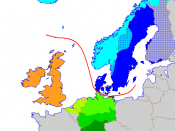
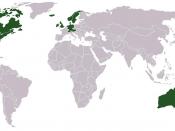
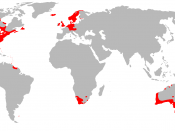
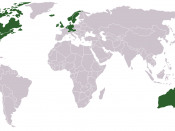
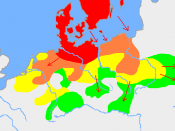
Good job
This essay provides a detail-rich background on English and a plethora of information on modern English. At the same time it's also explaining why English is adopted as the global language. The only thing that bugged me is that this essay was long and there were a few historical inaccuracies. For example, the printing press was invented by Gutenberg c1450. Otherwise, you're a B+ by my standards.
12 out of 13 people found this comment useful.